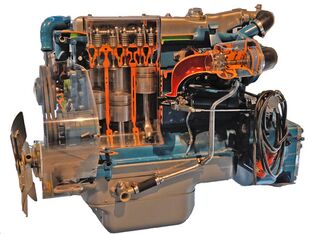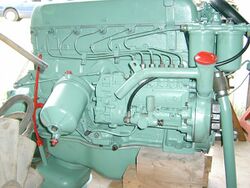Engineering:Mercedes-Benz OM352 engine
| Mercedes-Benz OM 352 | |
|---|---|
 OM 352 cutaway model on static display at the Unimog Museum Gaggenau. | |
| Overview | |
| Manufacturer | Daimler-Benz |
| Production | 1963-present |
| Layout | |
| Configuration | Inline-6 |
| Displacement | 5.675 L (346 cu in) |
| Cylinder bore | 97 mm (3.82 in) |
| Piston stroke | 128 mm (5.04 in) |
| Block material | Cast iron |
| Head material | Cast iron |
| Compression ratio | 16:1 |
| RPM range | |
| Idle speed | 700/min |
| Combustion | |
| Turbocharger | OM 352: none OM 352 A: Turbocharger OM 352 LA: Turbocharger and intercooler |
| Fuel system | Helix-controlled mechanical injection pump, direct injection |
| Fuel type | Diesel fuel (DIN 51601) |
| Cooling system | Water-cooled |
| Output | |
| Power output | 48–127 kW (65–173 PS; 64–170 hp) |
The Mercedes-Benz OM 352 is a 5.7 litre inline-6 cylinder 4-stroke Diesel engine, made by Daimler-Benz.
Development
It is one of many models in the 300 series of engines, which were developed during and after World War II, while specifically the OM352 was revealed in 1964. The OM352's lineage can be traced back to the OM311,[1] itself an 80 PS (59 kW) inline-six engine.[2] The OM352 has many applications, including marine, military, municipal, and agricultural vehicles, as well as stationary settings. The engine has differing trim and power levels, affording designations such as OM 352A a variant fitted with a turbocharger, or the OM352 LA, which is fitted with an intercooler and a turbocharger. (List of Mercedes-Benz engines.)
The engine is water-cooled, and is produced using cast-iron cylinder block, with cast-in cylinders. The engine utilizes diesel fuel delivered in a direct injection method from a Bosch PES style inline injection pump. The cylinder head is a single unit for all cylinders, and the cylinder head cover and air intake are shared by a single cast aluminum alloy. Exhaust ports 2&3 and 4&5 are siamesed together, presenting an exhaust manifold with only four outlets.
The crankshaft is a precision forged unit running in seven three-layer bearings, with counterweights bolted onto the crank webs, much like any other diesel motor of its vintage. The middle bearing is also the thrust bearing. The connecting rods are of a split design, with bronze bushings for the piston pin.
OM314
In 1965, a four-cylinder variant derived from the six-cylinder OM352 was introduced, the OM314. Typical output for trucks was 59 kW (80 PS), later 63 kW (85 PS).
Licensed production
The OM352 was also one of many Mercedes engines licensed in 1979 for manufacture by Atlantis Diesel Engines (ADE) in South Africa. These were known as ADE 352 and are virtually identical to the Mercedes engines. Recently the OM352 was licensed by Tata Motors for use in their 713S Trucks. These are manufactured by Tata but however have slight differences like the weights no longer being bolted to but rather part of the crank and no holes for oil sprayers in the block. These modifications are likely to reduce complexity and cost of engine production.
Common output power can vary from 92 to 141 kW (125 to 192 PS; 123 to 189 hp) depending on the fuel delivery and air charge options. Higher output can be achieved through special modifications, however engine longevity may be affected with such non-factory modifications.
Improved engines developed after the OM314 and OM352 include the OM364 (4 cylinders) and OM366 (6 cylinders), which look extremely similar in appearance and marked the final stage of development for the 300 series engines due to emissions requirements. Mercedes Benz 900 series engines are the successors of engines such as the OM300 series.[3]
OM352 variants for the German market
| Rated power (DIN 70020) | 48 kW | 50 kW | 59 kW | 62 kW | 66 kW | 74 kW | 81 kW | 92 kW | 93 kW | 96 kW | 110 kW | 115 kW | 124 kW | 127 kW |
|---|---|---|---|---|---|---|---|---|---|---|---|---|---|---|
| Type designation | OM 352.919 | OM 352.902 | OM 353.902 | OM 353.902 | OM 352.xxx | OM 352.xxx | OM 353.901 | OM 352.xxx | OM 352.xxx | OM 353.961 | OM 352.xxx | OM 352.xxx | OM 352.xxx | OM 352.xxx |
| Turbocharger | no | yes | ||||||||||||
| Year | 1964 | 1966 | 1969 | 1971 | 1965 | 1969 | 1969 | 1970 | 1963 | 19xx | 196x | 1966 | 1979 | 19xx |
| Source | [4] | [5] | [6] | [7] | [8] | [9] | [10] | [8] | [11] | [11][12] | [11] | [13] | [14] | [11] |
Technical specifications


| Model | OM 352 | OM 352 | OM 352 A | OM 353 | OM 352 LA |
|---|---|---|---|---|---|
| Year | 1964 | 1966 | 1975 | 1975 | 1979 |
| Vehicle | Unimog 406 (U 65) | Mercedes-Benz L 322 (L 1113) | Unimog 425 (U 1500) | Unimog 435 (U 1300 L) | Mercedes-Benz L 322 (LAF 1113) |
| Type designation | 352.919 | 353.961 | |||
| Configuration | Water-cooled Straight-six | ||||
| Operating principle | Diesel | ||||
| Valve system | OHV, two valves per cylinder | ||||
| Aspiration | Natural | Turbocharged | Natural | Turbocharged and intercooled | |
| Oil system | Wet sump | ||||
| Fuel system | Direct injection | ||||
| Bore × Stroke | 97 mm × 128 mm | ||||
| Displacement | 5.675 L | ||||
| Rated power (DIN 70020) | 48 kW (65 PS) at 2550/min | 93 kW (126 PS) at 2800/min | 110 kW (150 PS) at 2550/min | 96 kW (130 PS) at 2800/min | 124 kW (169 PS) at 2800/min |
| Max. torque (DIN 70020) | 353 N·m at 1600/min | 461 N·m at 1600/min | 363 N·m at 1700/min | ||
| Mean effective pressure | 784.5 kPa | 955 kPa | |||
| Mean piston speed | 11.95 m/s | ||||
| Injection pressure | 19.6 MPa | 19.6 MPa | |||
| Compression ratio | 17 : 1 | 16 : 1 | 17 : 1 | ||
| Mass | 410 kg | 460 kg | 460 kg | ||
| Firing order | 1–5–3–6–2–4 | ||||
| Sump capacity | 7–9 L | ||||
| Cooling system capacity | 24 L | ||||
| Alternator | 12 V, 0.24 kW | ||||
| Source | [4] | [15] | [16] | [12][17] | [14][18] |
References
- ↑ "The birth of a legend: the 300 engine series, first unveiled in 1949, is a major advancement" (in en). https://media.daimler.com/marsMediaSite/en/instance/ko/The-birth-of-a-legend-the-300-engine-series-first-unveiled-in-1949-is-a-major-advancement.xhtml?oid=9914319.
- ↑ "The birth of a legend: The 300 engine series - first unveiled in 1949 - is a major advancement". http://www.omnibusarchiv.de/include.php?path=article&contentid=493&page=7%29.
- ↑ "The birth of a legend: The 300 engine series - first unveiled in 1949 - is a major advancement". http://www.omnibusarchiv.de/include.php?path=article&contentid=493&page=9.
- ↑ 4.0 4.1 Carl-Heinz Vogler: Unimog 406 – Typengeschichte und Technik. Geramond, München 2016, ISBN 978-3-86245-576-8. p. 61.
- ↑ Carl-Heinz Vogler: Unimog 406 – Typengeschichte und Technik. Geramond, München 2016, ISBN 978-3-86245-576-8. p. 71.
- ↑ Carl-Heinz Vogler: Unimog 406 – Typengeschichte und Technik. Geramond, München 2016, ISBN 978-3-86245-576-8. p. 76.
- ↑ Carl-Heinz Vogler: Unimog 406 – Typengeschichte und Technik. Geramond, München 2016, ISBN 978-3-86245-576-8. p. 80.
- ↑ 8.0 8.1 Carl-Heinz Vogler: Unimog 406 – Typengeschichte und Technik. Geramond, München 2016, ISBN 978-3-86245-576-8. p. 104.
- ↑ Carl-Heinz Vogler: Unimog 406 – Typengeschichte und Technik. Geramond, München 2016, ISBN 978-3-86245-576-8. p. 102.
- ↑ Carl-Heinz Vogler: Unimog 406 – Typengeschichte und Technik. Geramond, München 2016, ISBN 978-3-86245-576-8. p. 106.
- ↑ 11.0 11.1 11.2 11.3 Daimler AG: Geburt einer Legende: Die 1949 vorgestellte Motorenbaureihe 300 ist ein großer Wurf. 22 April 2009. Retrieved 4 February 2018.
- ↑ 12.0 12.1 A. G. Daimler-Benz (Hrsg.): Unimog 435 Workshop manual, Book 1 Section 1.2/1.
- ↑ Daimler AG: Dieselmotoren in Mercedes-Benz-Nutzfahrzeugen. Retrieved 4 February 2018.
- ↑ 14.0 14.1 Bundesamt für Bevölkerungsschutz und Katastrophenhilfe: Schlauchwagen SW 2000-Tr
- ↑ Verband der Automobilindustrie: Daimler-Benz AG. Typ L 1113 LK 1113 Gruppe 14, Dezember 1966. DK 629.113.5
- ↑ Oldtimer-Traktor. Volume 11–12/2012.
- ↑ Bundesamt für Bevölkerungsschutz und Katastrophenhilfe: Typenblatt Rüstwagen RW1
- ↑ Maass, Harald (1979). "Gestaltung und Hauptabmessungen der Verbrennungskraftmaschine". in List, Hans. Die Verbrennungskraftmaschine – Neue Folge. 1. Wien/New York: Springer Verlag. p. 250. ISBN 3-211-81562-7.
 |
